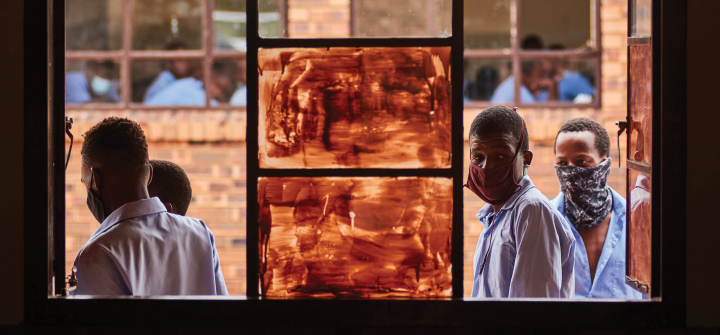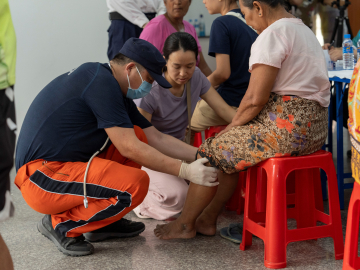Africa’s New Approach to Public Health
Existing patterns of health funding and emergency response in Africa—many of which focus on filling short-term gaps and aligning with donor interests—are insufficient.
The 255,000+ COVID-19 deaths across the continent, as well as the many hospitalizations and long recoveries have delivered a painful lesson. The response and recovery have been slowed by limited resources, an overstretched health workforce, and low vaccination rates. If we do not act now to strengthen health security and build resilient health systems, Africa, and indeed the world, will remain vulnerable to disease outbreaks and epidemics.
Africa’s vision of a New Public Health Order, first proposed in 2017, is actively tackling health challenges and planning for the future, shaped by local leadership and regional solutions. It aims to ensure that effective health systems exist before a crisis and remain resilient during and post-crisis.
To achieve this vision, the Africa Centres for Disease Control and Prevention is working closely with African Union Member States and strategic partners focusing on the 5 pillars of the New Public Health Order—all of which will be discussed at the upcoming 2nd International Conference on Public Health in Africa December 13-15 in Kigali, Rwanda.
How do we create this New Public Health Order?
We must strengthen public health institutions at the continental, regional, and national levels. Continental institutions such as the Africa CDC and the African Medicines Agency serve a key coordinating function. National Public Health Institutes are central to managing disease threats; 40 such agencies are functional or in advanced stages of operationalization in Africa. Currently, 12 African countries have functional public health emergency operation centers, and several others supported by Africa CDC are working to establish or improve their PHEOCs through dedicated facilities, staff, and budgets, as championed by H.E President Hakainde Hichilema of Zambia.
We must also strengthen the public health workforce and create career pathways that retain trained staff on the continent who can respond to disease threats while delivering essential services simultaneously. Many initiatives are underway to boost the capacity of the health workforce across the continent, with strong backing by Africa’s Heads of State and Government. For example, the first cohort of the Kofi Annan Fellowship in Global Health Leadership graduated in May, and its second cohort is in training; 150 epidemiologists and biostatisticians are currently being trained in a joint program by Africa CDC and the European and Developing Countries Clinical Trials Partnership; and the first cohort of the Africa CDC - Harvard Global Nursing Leadership Program launched in September.
Additionally, Africa must expand local manufacturing of health products to ensure access to vaccines, diagnostics, and other critical medical supplies. Initiatives such as the Partnership for African Vaccine Manufacturing are working to enable African countries to plan, develop, and produce more than 60% of the total human vaccine doses required on the continent by 2040. Multi-sector collaboration at regional and international levels is required to achieve this goal, with a recent call by African Heads of States for GAVI and the UN to purchase 30% of their vaccines from African manufacturers.
African countries must increase domestic resources for health and invest in local expertise, technical resources, and institutions, as well as innovative financing mechanisms and public-private partnerships. Heads of State and Government at the AU Summit in February agreed to upgrade the AU COVID-19 Response Fund to the Africa Epidemics Fund and to develop a mechanism to ensure the replenishment for future pandemic preparedness. National health ministries, local public health institutions, and regional bodies such as the AU should also advocate for increased and sustained health budgets and hold countries accountable to their commitments.
African countries and development partners must build respectful, action-oriented, and sustainable partnerships that promote country ownership and African health priorities. For example, the Africa CDC recently partnered with the Mastercard Foundation in a $1.5 billion multi-year grant and the World Bank in a $100 million multi-year grant for pandemic preparedness, with priorities set by Africa. These are models for partnership that address Africa’s health priorities respectfully and effectively.
The future of health in Africa will be a story of hope and obstacles. Disease outbreaks are on the rise; climate change, food insecurity, population growth and political instability bring new health risks; and too many lives are lost to preventable diseases. Despite these considerable challenges, innovations, strategic health investments, and African-driven solutions can improve health outcomes and drive progress. In addition, African-led convenings, such as CPHIA 2022, offer opportunities for local, regional, and global partners to strengthen scientific collaboration and innovation.
The vision for a New Public Health Order in Africa is bold and ambitious—yet achievable and vital for an integrated and prosperous continent.
Ahmed Ogwell Ouma, MPH, MPhil, is currently the acting director of the Africa CDC; Mahlet Kifle Habtemariam, MD, MPH, is a senior regional engagement advisor at the Africa CDC; and Shingai Machingaidze, MPH, is a senior science officer for the Africa CDC
Students participate in a rural vaccination drive at a school in Mpumalanga, South Africa, on March 9, 2022. Waldo Swiegers/Bloomberg via Getty Images




